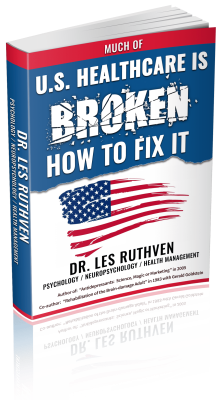Last updated on January 6th, 2024 at 08:34 am
The findings from this study by a psychologist and an internal medicine specialist— if implemented— would substantially improve the quality of U.S. healthcare and would lower its costs by well over 50%!
Physician training, at both the undergraduate and medical school level, is largely in the bio physical sciences such as biology, chemistry, genetics, anatomy and other physical sciences. Such an emphasis is warranted because there are many diseases and knowledge of the bio physical sciences is appropriate in treating many diseases such as cancer, heart disease, diabetes and doing intricate organ transplants. However, such training may dispose physicians to concentrate on finding bio physical solutions to health problems (such as prescription medicines) when many health problems may not arise due to disease but to non-disease or non-organic factors in the patient’s life such as adverse life situations or stress.
The researchers, K. Kroneke and S.D. Mangelsdorph (Ref. # 1), one a psychologist and the other an Internal Medicine specialist, took on this research question in a health plan and a hospital at a large military installation. The researchers were aware that there are 14 most common non-specific symptoms, non-specific in that the symptom may arise from an organic disease or from a non-organic or psycho social factors in the patient’s life. For example, patients with these common symptoms arrive at both offices of psychologists and physicians. To answer these questions the researchers selected 1,000 new patients who had not previously been diagnosed with a disease and the initial physical examination could not confirm an organic diagnosis. Once selected for the study these patients received lab work and other diagnostic procedures until a disease was found or not found. In the table below the data is presented for each of the 14 common symptoms in which each symptom was found to have an organic or a non-organic origin.
TABLE
Common Symptoms Disease found Not found
Chest pain 6% 94%
Fatigue 9% 91%
Dizziness 9% 91%
Headache 5% 95%
Edema (swelling) 15% 85%
Back pain 3% 97%
Dyspnea 29% 71%
Insomnia 0% 100%
Abdominal pain 11% 89%
Numbness 12% 88%
Impotence 15% 85%
Weight loss 0% 100%
Cough 13% 87%
Constipation 0% 100%
Average 9% 91%
Only 9% of these 1,000 patients with one or more common symptoms were found to have an organic disease! This finding would be shocking for most of the general public and most physicians, even most psychologists. Most of our health problems that bring us to our physicians for care are due to stress over adverse life situations or what might be called psychological problems of everyday living! When a physician treats a non-disease health problem as if it were a disease the result is inappropriate treatment and wasted healthcare dollars. An examination of the above table gives us clues in which areas of healthcare are likely to the associated with both poor quality care and high costs. Only 3% of patients with back pain are found to have back disease and in the light of this can we justify 10,000,000 steroid injections for back pain annually and tens of thousands of back surgeries annually. 100% of us, if we live long enough, will have had several episodes of back pain, some of which resolve without any treatment at all and others respond to physical therapy, weight loss, normal exercise and even Cognitive Behavioral Therapy (CBT). This is not to say that for some back disease surgery is mandatory but back surgery is greatly over used when a number of non-invasive procedures are adequate to resolve back difficulties. When we know from the table that there is only a 5% chance that your headaches are due to a disease how can we justify sending 12% of these headache patients for an MRI to rule out a brain tumor! There is a zero percentage chance that our insomnia arises from an organic disease and when many cases of insomnia respond to a sleep hygiene program can we really justify physicians treating this disorder with benzodiazepines or sending the patient to 2,500 sleep centers for a $3,000 sleep treatment?
As noted above many health problems arise not from a disease but from many life difficulties that might be considered of a “psychological” nature. Some persons with one or more of these common symptoms on the basis of non-organic factors have a diagnosable disorder but many do not. Insomnia can be a consequence of a diagnosable depression or anxiety disorder (among others) but insomnia itself is not diagnostic of a mental disorder (or “disease” as many psychiatrists like to say). If it were 100% of us would have a diagnosable mental disorder!
These non-organic health problems are extremely prevalent in society and at physician offices yet are physicians on the basis of their training qualified to treat non-organic health problems? Unfortunately psychiatry and the pharmaceutical industry have convinced the medical profession that these behavioral health and psycho social disorders are diseases and physicians are qualified to treat these non-organic health problems with psychiatric drugs! Physicians with psychiatric drugs have become the largest provider group treating mental disorders in the US today! Primary care physicians are particularly fond of prescribing antidepressant drugs to treat a variety of mental health problems. However, are antidepressant drugs effective in treatment these disorders? Two researchers, under the freedom of information act (Ref. # 2), analyzed all of the submitted FDA antidepressant and placebo controlled trials and found that almost 50% of the trials found no superiority of the drug over placebo in treating moderate and severe depression! Of the trials with positive drug findings over placebo, Kirsch and Saperstein found the placebo effect was 80% of the drug effect which is clinically negligible!
In conclusion perhaps physicians should restrict their practice to what physicians have been trained to do, treat disease, and refer these patients with a disease to health psychologists to treat the behavioral/emotional effects of diseases such as type 2 diabetes, heart disease, cancer and others.
References:
Ref. # 1 K.Kroneke and S.D. Mangelsdorph. “Causes of Common Symptoms in Primary Care Medicine”, Am. J. of Medicine, 86, 1999, 262-266.
Ref. # 2 Kirsch, I. and Saperstein, G. “Listening to Prozac but hearing Placebo: a Meta-analysis of antidepresant medication



